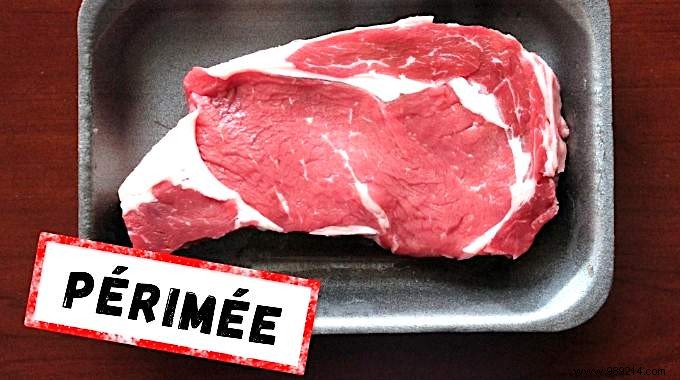
Some products can be consumed even after an expiry date has passed.
On the other hand, be careful not to mess with certain foods.
I don't want to scare you, but for those, it is imperative to respect the dates.
Do you know what foods these are? Seeing your hesitation, I don't get the impression!
Do not panic; I'm here to help you sort it out.
Discover 8 foods not to eat after their expiry date. Watch:

A rancid smell, a slightly sticky appearance associated with an unappetizing color.
You are definitely in front of spoiled meat . And in this case, be careful not to consume it!
At best, it's good food poisoning waiting for you, at worst, salmonellosis.
Be especially careful when dealing with minced meat that is not sold vacuum-packed.
The meat must in this case be consumed within 12 hours maximum and be kept in the refrigerator.
And for your midday tartare, ask your butcher to have the meat minced in front of you.
In general, if in doubt about the freshness of the meat, do not eat it.
The consequences on your health can be extremely serious.
The precautions to be taken for fish are almost similar to those for meat.
Eat your fish the day of purchase, at worst the next day.
And in the same way as with meat, take a good look at its appearance before eating it.
Pale skin and a pale eye are warning signs of not very fresh fish.
When purchasing vacuum-packed fish, be careful that the packaging the is not swollen.
If this is the case, it is certainly that many bacteria have taken up residence!
And when it comes to fish, bacteria are to be feared! Listeria, Salmonella, Escherichia Coli...
This is what awaits you at the bend of a not very fresh fish.
For seafood, same rules to follow. Never consume them after a past expiry date .
This is especially the case for shrimps, oysters and shellfish which can make you very sick.
Obviously, keep all these beautiful people cool.
For live crustaceans, a temperature of 3 degrees is recommended.
The charcuterie, hmm, how good.
But be careful, this type of food is very perishable .
This is especially the case for cooked ham, hot dogs or sliced deli meats.
So if you see a change in color or smell, sorry, but go to the trash.
Otherwise, you could be eating salmonella or listeria deli meats!
Cold cuts preserved under vacuum can be stored longer.
Consume nevertheless within 5 days after opening.
Finally,a charcuterie ends up being salted, dried or smoked has a longer lifespan.
After opening, they can be stored for up to 2 or 3 weeks.
Ah yes, last thing.
Above all, do not exceed the expiry date for pâtés, rillettes, sausages and white hams.
And once opened, I advise you to consume them within 24 to 48 hours.
The rules for eating eggs are different depending on how you store them.
An intact raw egg can be kept for about 21 days in the fridge from the date of laying.
A hard-boiled egg is about 1 week after cooking.
As for the white, it can be kept for 1 week in the fridge once extracted from the shell.
Attention, this is not the case for the egg yolk!
It only keeps for a few hours.
And to find out if your eggs are still good to eat, discover the trick here.

Many people love to drink a fresh fruit juice in the morning.
Know first that it is not very good for your health and that it is better to eat an orange!
But if you consume pressed fruit juices, be aware that they should not be kept for very long.
Why ? Because these fresh fruit juices have not undergone the usual preservation processes (pasteurization).
In other words, bacteria or viruses can easily enter your cocktail!
So respect the expiry date, the conservation time being generally 5 days.
A common misconception is that all cheeses can be stored long after they expire.
In reality, some cheeses must be eaten before the expiry date!
This rule is all the more to be respected when it comes to raw milk cheese and fresh cheese.
The latter are indeed very sensitive to bacteria (because they are not pasteurized), so be careful!
Either way, whenever you see or smell something weird, don't tempt fate if you're sensitive.
At worst, cut off the suspicious-looking piece and eat the rest.
Here are some indications according to the different types of cheese:
- Cheese without formed rind (cottage cheese, ricotta...):from a few days to 2 weeks
- Soft cheese (camembert, munster...):1 week
- Semi-soft cheese (Morbier, raclette, etc.):2 to 3 weeks
- Firm cheese (Gruyère, Beaufort, etc.):5 weeks
- Hard cheese (comté, parmesan, etc.):10 months
- Industrially produced cheese (cancoillotte, mozzarella, etc.):3 to 4 days
Sprouts such as Alfalfa, bean sprouts and others are produced in humid and warm environments.
This microcosm is therefore favorable to the appearance of the bacterium of E. Coly.
So wash these sprouts extremely well and above all consume them before the expiry date.
If the sprout begins to turn black or mold appears on the sprout, discard them immediately.
If you buy bagged salads, don't be fooled by appearances.
It is not because they seem super well washed that they do not hide bacteria (E. Coly in particular).
Once out of the bag, wash these salads and do not exceed the expiry date.